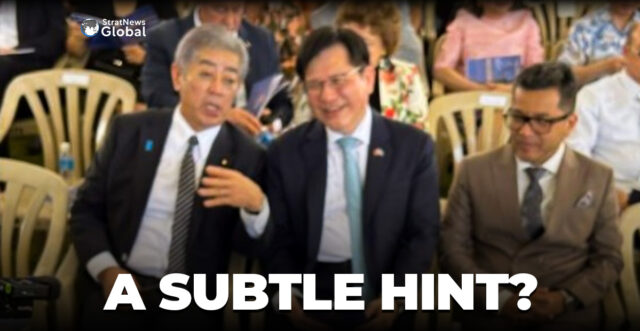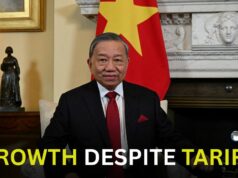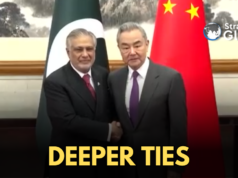The inauguration of Palau President Surangel S. Whipps Jr. and Vice President Raynold Oilouch on January 16 served as a revealing litmus test for regional alliances and global diplomatic priorities in the Pacific.
And the presence of a senior Indian minister at the inauguration at the event merits notice.
While rhetoric often centres around notions of “Pacific family” and inclusivity, the event highlighted stark geopolitical realities, particularly regarding China’s influence, argues Cleo Paskal, a non-resident senior fellow at the Foundation for Defense of Democracies focusing on the Indo-Pacific region.
Palau’s recognition of Taiwan has made it a frequent target of Chinese economic pressure, cyber intrusions, and organized crime activities. Attending the inauguration, therefore, carried implicit geopolitical consequences, with countries forced to weigh solidarity with Palau against potential diplomatic fallout with Beijing, notes Paskal in an incisive analysis in the Pacific Island Times.
While India sent Minister of State for External Affairs, Pabitra Margherita—marking the first visit by an Indian official of this rank to Palau, Japan demonstrated its commitment by dispatching its foreign minister Takeshi Iwaya. Taiwan was represented by its foreign minister and a significant business delegation.
One of the most scrutinized moments of the event occurred when Taiwan’s foreign minister was seated between Japan’s foreign minister and India’s Margherita, sending a clear message of support.
In addition, leaders from the two other Pacific nations that recognize Taiwan—Marshall Islands President Hilda Heine and Tuvalu Prime Minister Feleti Teo—were present.
Papua New Guinea (PNG) Prime Minister James Marape also attended, reinforcing his reputation for prioritizing regional ties over external pressures. Guam Governor Lou Leon Guerrero and Pacific Islands Forum Secretary General Baron Waqa were also in attendance.
Despite the rhetoric of regional unity, no other Pacific island leaders attended apart from those representing Taiwan-aligned nations and PNG. Even the president of the Federated States of Micronesia (FSM), a neighbouring Compact state, was absent, sending his vice president instead—a move widely perceived as a concession to Beijing’s preferences.
Australia’s presence was similarly muted. While it maintains an ambassador in Palau, only an assistant minister was dispatched from Canberra, a notable contrast to Japan’s high-level representation.
Congratulatory messages poured in from global figures, including the Japanese emperor, India’s president, and European monarchs. However, regional leaders largely refrained from similar gestures, signalling a hesitation to openly align with Palau’s stance.
A diverse array of diplomatic representatives attended, underscoring growing interest in the Pacific. The UAE sent a special envoy, arriving on a private aircraft, while ambassadors from Austria, Chile, Germany, Korea, Kosovo, Malaysia, Morocco, New Zealand, Norway, the Philippines, Serbia, Thailand, Vietnam, and Russia were also present. The presence of Russia’s envoy notably sparked murmurs among attendees.
The timing of the inauguration, just four days before the U.S. presidential transition, contributed to a lacklustre American presence. The highest-ranking official from Washington was Carmen Cantor, assistant secretary at the Department of Insular Affairs, who left her position shortly thereafter.
While the U.S. maintains a well-regarded ambassador in Palau, the lack of high-level military and diplomatic representation raised concerns. No senior military leaders from regional commands attended, reportedly due to a concurrent meeting in Hawaii.
The congratulatory letter from Washington bore the signature of Secretary of State Antony Blinken rather than President Biden, a move perceived as a signal of U.S. disengagement.
Palau’s inauguration served as a prelude to broader regional developments, including the upcoming Pacific Islands Forum in the Solomon Islands—a country that notably abstained from the event. The absence of many Pacific leaders in Palau calls into question the authenticity of claims about regional solidarity and resistance to external influence.
China’s influence continues to shape diplomatic decisions, with some Pacific nations opting for cautious diplomacy rather than overt demonstrations of alignment. However, PNG’s willingness to engage despite Beijing’s preferences stands as an example of regional agency.
The 2025 Pacific Islands Forum later this year will likely further illuminate these shifting allegiances. As geopolitical lines are drawn, the question remains: which nations will uphold the principles of sovereignty and regional unity, and which will yield to external pressures?
In a career spanning three decades and counting, Ramananda (Ram to his friends) has been the foreign editor of The Telegraph, Outlook Magazine and the New Indian Express. He helped set up rediff.com’s editorial operations in San Jose and New York, helmed sify.com, and was the founder editor of India.com.
His work has featured in national and international publications like the Al Jazeera Centre for Studies, Global Times and Ashahi Shimbun. But his one constant over all these years, he says, has been the attempt to understand rising India’s place in the world.
He can rustle up a mean salad, his oil-less pepper chicken is to die for, and all it takes is some beer and rhythm and blues to rock his soul.
Talk to him about foreign and strategic affairs, media, South Asia, China, and of course India.





